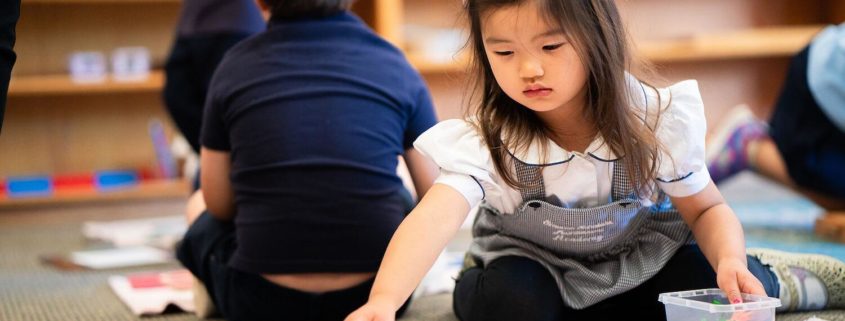The Montessori teaching method offers a different form of education for young children. Developed by Maria Montessori, an Italian educator in the early 1900s, Montessori education stresses the need for child-centered learning that prioritizes independence and student flexibility. Known for fostering individual-paced learning, a Montessori education program has several benefits.
If you are a parent considering enrolling your child in this type of educational setting, this guide is for you! Continue reading to learn more about Montessori preschool benefits and set your child up for lifelong success.
Top 10 Benefits of a Montessori Education
Unlike traditional schooling, a Montessori educational system is set up to address individual student needs and abilities as opposed to group learning. With this in mind, here are the top 10 Montessori preschool benefits:
1. Emphasis on child-focused learning
In a traditional classroom, teachers rely on an established curriculum, hoping to reach as many students as possible. Group engagement can be problematic since each student is unique in their learning abilities. There is no structure around individual needs.
A Montessori classroom, on the other hand, recognizes the need for individualized learning. The lessons and activities are designed to accommodate several learning styles, abilities, and interests. More importantly, students learn at their pace, providing a pathway for greater academic and personal success.
2. Social Interactions
The value of social development in preschoolers cannot be underestimated. Children learn to communicate, mimic appropriate behaviors, and develop a sense of identity when interacting with other peers. A Montessori system places mixed-aged children together, allowing them to collaborate and learn vital interpersonal skills.
The interactions are crucial since older children can serve as mentors while young children begin to feel valued and appreciated.
3. Enhanced curiosity and a love for learning
Unlike traditional classroom settings where teachers rely on textbooks and materials, a Montessori preschool fosters a love for learning and enhances a child’s curiosity. Because children select their learning and activities, they perceive education as something to be enjoyed rather than endured.
More importantly, this type of learning incentivizes students to broaden their thinking and embrace lifelong learning.
4. Focuses on hands-on learning
Rather than focusing on abstract forms of learning, students in a Montessori school rely on various hands-on activities for enhanced learning capabilities and concentration. For example, children can stack, sort, and manipulate multiple objects until they have mastered their strategies.
Teachers can help students master their skills by providing hands-on activities that expose them to language, math, and geography.
5. Teachers serve as guides, not instructors
In Montessori Preschool, teachers guide students through their learning path as opposed to giving instructions. Instead of standing in front of a chalkboard instructing students on how to sing the ABCs, teachers foster an environment built on independence, freedom, and curiosity. Teachers mentor and encourage children to take charge of their learning as they cultivate their development.
6. Encourages cooperation
Since children are allowed to decide their agendas and activities, they learn how to cooperate and respect their peers. The nature of a Montessori setting incentivizes selfless behavior in children. Examples of actions include sharing toys, treating others with kindness, and expressing gratitude when something is done for them.
7. Incorporates developmental stages
In a Montessori classroom, children develop skills and learning abilities suited for their age range. For example, young children can focus on basic language skills and learning how to count, while older preschool students focus on more advanced forms of math, geography, and science. They can also learn through community engagement, such as field trips and special events.
8. Promotes self-discipline
It is no surprise that some young kids lack discipline and self-regulation. The Montessori method establishes an active environment where children naturally learn how to control themselves and behave appropriately. Teachers lay the ground rules while students learn in accordance with these established regulations. Doing so helps them develop critical self-control behaviors.
9. Fosters independence
Because Montessori students engage in an autonomous classroom setting, they learn how to operate independently and develop greater self-confidence. Said differently, students in a Montessori classroom develop greater self-sufficiency and learn to challenge themselves in an active environment.
10. Enhances academic success
According to one longitudinal study, Montessori students fared better on measures involving academic achievement than conventional preschoolers. While more research is necessary to make definitive conclusions, this study raises interesting points about the need for an unconventional form of child education.
Enhance Your Child’s Future With Cadence Education
As you can see, there are several Montessori preschool benefits. Here at Cadence Education, we believe that each student flourishes in a unique manner. As a premier childhood educator in the United States, we seek to establish engaging academic environments, providing students with unparalleled opportunities for success.
Check out our Montessori programs, or contact us with any questions.

